The European institutions in a nutshell
The European Union has currently 27 member states and a total population of 450 million citizens. They live in a single market area and can freely move from one EU country to another. The Union has seven institutions and over 30 decentralised agencies. Each has its own powers and competencies as mentioned in the Treaties on the European Union and other multilateral EU agreements signed over the past seven decades.
The main decision-making institutions are the European Commission, the European Council and the Council of the European Union, and the European Parliament. While the Parliament has its official headquarters in Strasbourg, France and offices in Brussels and Luxembourg, the Commission and the Council are headquartered in Brussels.
Besides these, the EU has more institutions and bodies. They are extremely important for financial stability of the Union and the legal order, including the issue of transparency and accountability.
The Court of Justice of the European Union (CJEU) in Luxembourg ensures that EU law is applied across the EU and that the Treaties are correctly interpreted and applied by national courts. The European Central Bank (ECB) in Frankfurt, Germany is responsible for the monetary and exchange rate policy in the Eurozone as well as keeping prices stable in the euro area. The European Court of Auditors (ECA) in Luxembourg contributes to improving EU financial management, to promoting accountability and transparency and it acts as the independent guardian of the financial interests of the EU by checking if EU funds are correctly spent.
Click on the institution name below to read more
The European Council consists of the heads of government of the 27 member states (i.e. either the president or prime minister). It meets at least four times a year in Brussels. These meetings are called summits and are chaired by the president of the European Council (currently Charles Michel of Belgium), who is elected by the European Council for a period of 2.5 years.
The European Council defines the EU’s overall direction and key policies/priorities. The summits set the policy agenda and but do not perform legislative functions. Decisions are usually taken by consensus. The European Council usually adopts conclusions which set out the EU’s position on key policy matters, provide guidance for the work of the other EU institutions and bodies, and settle some specific issues.
The European Council may decide to ask the Commission to prepare a proposal to address a certain issue or alternatively pass it on to the Council of the EU. The European Council represents the highest level of political cooperation between EU countries. While prior to 2009 there were summit meetings as well, the European Council has since taken the form of a permanent EU institution.
The Council of the European Union, often just called “the Council” or “Council of Ministers”, is an institution composed of the delegates of member states at ministerial or ambassador level.
Every six month, a different member state takes over the presidency of the Council – with the exception of the Foreign Affairs Council, which is always chaired by the High Representative for Foreign and Security Policy of the EU (currently Josep Borrell). The rotating presidency of the Council pivots the work of the institutions and tries to broker compromises between the various member states and the other EU institutions.
The Council meets in ten different shapes and configurations usually once a month either in Brussels or in Luxembourg, depending on the policy area being discussed (e.g. justice ministers, environment ministers).
Depending on the subject matter, the Council takes its decisions by a simple majority, qualified majority or unanimously. Most decisions taken are by the so-called qualified majority vote (QMV). Two conditions are necessary to obtain such a majority in the Council:
– 55% of EU member states must vote in favour – currently, this means 15 out of 27 states must approve
– the proposal must in addition be supported by member states that represent at least 65 percent of the EU population.
In some policy areas, notably foreign affairs and defence, the Council still by and large takes its decisions unanimously. This means for example that EU sanctions against nationals of third countries must be agreed by all 27 member states. The powers of the Council of the EU are described in the Treaties on the European Union, where it is stated that the Council shall:
- negotiate and adopt EU laws, in most cases with the Parliament
- coordinate member states’ policies
- develop the EU’s common foreign and security policy
- conclude international agreements
- adopt the EU budget, together with the Parliament
The European Commission (EC) is the main executive arm of the European Union. It is headed by a President (currently Ursula von der Leyen) and is composed of as many members (called commissioners) as there are EU member states.
The commissioners can be compared to ministers in national governments and hold individual portfolios (e.g. trade, competition) attributed to them by the president. However, the College of Commissioners is a collective body, and major decisions are taken by all commissioners together.
The institution is divided into departments most of which are called Directorates-General (DGs). Each is headed by a Director-General. The administration of the Commission includes more than 30,000 officials, making it by far the largest EU institution.
The powers of the European Commission are described in Treaties on the European Union.
Accordingly, the Commission shall:
- promote the general interest of the EU (it must not follow orders from individual states)
- ensure the application of the founding treaties and laws of the EU by the member states
- execute the budget
- exercise coordinating, executive and management functions
- ensure the external representation of the Union – with the notable exception of foreign and security policy;
The Commission holds almost exclusive competence on proposing new EU laws, though in practice it also acts on the advise of the Council. The College of Commissioners is subject to the approval of the European Parliament. If a majority of lawmakers votes for a no-confidence motion, a new Commission needs to be appointed.
This has happened only once so far, in 1999. However, to get its legislative proposals through the Parliament, the Commission relies on the support of lawmakers.
The European Parliament (EP) is composed of 705 members (MEPs) who are directly elected by the population in EU-wide elections every five years. As the largest member state, Germany sends 96 MEPs. Malta, Luxembourg and Cyprus as the smallest member states have six lawmakers each. The last EP election was held in May 2019.
The members of the European Parliament are currently divided into seven political groups (in order of size):
- European People’s Party (EPP)
- Group of Socialists and Democrats (S&D)
- Renew Europe (Liberals)
- Greens/European Free Alliance (Greens/EFA)
- Identity and Democracy (ID)
- European Conservatives and Reformists (ECR)
- Left – GUE/NGL (The Left).
The EP has its seat in Strasbourg, where it meets once a month in plenary session. However, most of the time, MEPs are in Brussels, where group and committee meetings are held.
The powers of the European Parliament are described in the Treaties on the European Union, where it is stated that the European Parliament shall:
- adopt EU laws, together with the Council
- adopt the EU budget, together with the Council, and approve its execution
- adopt non-binding resolutions on various issues
- approve international agreements (e.g. on trade) and treaties regarding new EU member states
- provide democratic scrutiny of other EU institutions
- elect the president of the European Commission (upon a proposal of the European Council)
- approve the new Commission as a whole and discharge it (no-confidence motion)
- sets the interest rates at which it lends to commercial banks in the eurozone (also known as the euro area), thus controlling money supply and inflation
- manages the eurozone’s foreign currency reserves and the buying or selling of currencies to balance exchange rates
- ensures that financial markets and institutions are well supervised by national authorities, and that payment systems work well
- ensures the safety and soundness of the European banking system
- authorises production of euro banknotes by eurozone countries
- monitors price trends and assesses risks to price stability.
The Court of Justice of the EU (CJEU) established in 1952 and has its seat in Luxembourg. CJEU constitutes the judicial authority of the European Union and, in cooperation with the courts and tribunals of the Member States, it ensures the uniform application and interpretation of EU law.
The CJEU gives rulings on cases brought before it. The most common types of case are:
- interpreting the law (preliminary rulings) – national courts of EU countries are required to ensure EU law is properly applied, but courts in different countries might interpret it differently – national court can ask the CJEU for clarification.
- enforcing the law (infringement proceedings) – this type of case is taken against a national government for failing to comply with EU law. Can be started by the European Commission or another EU country and might result in a fine.
- annulling EU legal acts (actions for annulment) – the Court can be asked to annul an act that is contrary to the Treaties – by an EU government, or an EU institution. Citizens can also ask the Court to annul an EU act that directly concerns them.
- ensuring the EU takes action (actions for failure to act) – EU institutions must make certain decisions under certain circumstances. If they don’t, EU governments, other EU institutions or individuals or companies can complain to the Court.
- sanctioning EU institutions (actions for damages) – any person or company who has had their interests harmed as a result of the action or inaction of the EU or its staff can take action against them through the Court.
The European Court of Auditors (ECA) was set up in 1977 and is based in Luxembourg. The ECA is the EU’s independent external audit organization and employs around 800 people. The main purpose of the ECA is to check that EU funds are collected and used appropriately, and to help improve EU financial management.
The ECA is run by a Board of 27 members, one from each EU country. The ECA does not have legal powers, but primarily works to improve the European Commission’s management of the EU budget.
The Court of Auditors:
- audits EU revenue & expenditure, to check EU funds are correctly raised, spent, achieve value for money and accounted for
- checks any person or organisation handling EU funds – including spot checks in EU institutions (especially the Commission), EU countries and countries receiving EU aid
- writes up findings and recommendations in audit reports, for the European Commission and national governments
- reports suspected fraud, corruption, or other illegal activity to the European Anti-Fraud Office (OLAF)
- produces an annual report for the European Parliament and Council of the EU, which the Parliament examines before deciding whether to approve the Commission’s handling of the EU budget
- gives its expert opinion to EU policymakers on how EU finances could be better managed and made more accountable to citizens
Click on the institution name below to read more
The European Council consists of the heads of government of the 27 member states (i.e. either the president or prime minister). It meets at least four times a year in Brussels. These meetings are called summits and are chaired by the president of the European Council (currently Charles Michel of Belgium), who is elected by the European Council for a period of 2.5 years.
The European Council defines the EU’s overall direction and key policies/priorities. The summits set the policy agenda and but do not perform legislative functions. Decisions are usually taken by consensus. The European Council usually adopts conclusions which set out the EU’s position on key policy matters, provide guidance for the work of the other EU institutions and bodies, and settle some specific issues.
The European Council may decide to ask the Commission to prepare a proposal to address a certain issue or alternatively pass it on to the Council of the EU. The European Council represents the highest level of political cooperation between EU countries. While prior to 2009 there were summit meetings as well, the European Council has since taken the form of a permanent EU institution.
Lorem ipsum dolor sit amet, consectetur adipiscing elit. Ut elit tellus, luctus nec ullamcorper mattis, pulvinar dapibus leo.
The European Commission (EC) is the main executive arm of the European Union. It is headed by a President (currently Ursula von der Leyen) and is composed of as many members (called commissioners) as there are EU member states.
The commissioners can be compared to ministers in national governments and hold individual portfolios (e.g. trade, competition) attributed to them by the president. However, the College of Commissioners is a collective body, and major decisions are taken by all commissioners together.
The institution is divided into departments most of which are called Directorates-General (DGs). Each is headed by a Director-General. The administration of the Commission includes more than 30,000 officials, making it by far the largest EU institution.
The powers of the European Commission are described in Treaties on the European Union.
Accordingly, the Commission shall:
- promote the general interest of the EU (it must not follow orders from individual states)
- ensure the application of the founding treaties and laws of the EU by the member states;
- execute the budget;
- exercise coordinating, executive and management functions;
- negotiate international agreements
- ensure the external representation of the Union – with the notable exception of foreign and security policy;
The Commission holds almost exclusive competence on proposing new EU laws, though in practice it also acts on the advise of the Council. The College of Commissioners is subject to the approval of the European Parliament. If a majority of lawmakers votes for a no-confidence motion, a new Commission needs to be appointed.
This has happened only once so far, in 1999. However, to get its legislative proposals through the Parliament, the Commission relies on the support of lawmakers.
The Council of the European Union, often just called “the Council” or “Council of Ministers”, is an institution composed of the delegates of member states at ministerial or ambassador level.
Every six month, a different member state takes over the presidency of the Council – with the exception of the Foreign Affairs Council, which is always chaired by the High Representative for Foreign and Security Policy of the EU (currently Josep Borrell). The rotating presidency of the Council pivots the work of the institutions and tries to broker compromises between the various member states and the other EU institutions.
The Council meets in ten different shapes and configurations usually once a month either in Brussels or in Luxembourg, depending on the policy area being discussed (e.g. justice ministers, environment ministers).
Depending on the subject matter, the Council takes its decisions by a simple majority, qualified majority or unanimously. Most decisions taken are by the so-called qualified majority vote (QMV). Two conditions are necessary to obtain such a majority in the Council:
– 55% of EU member states must vote in favour – currently, this means 15 out of 27 states must approve
– the proposal must in addition be supported by member states that represent at least 65 percent of the EU population.
In some policy areas, notably foreign affairs and defence, the Council still by and large takes its decisions unanimously. This means for example that EU sanctions against nationals of third countries must be agreed by all 27 member states. The powers of the Council of the EU are described in the Treaties on the European Union, where it is stated that the Council shall:
- negotiate and adopt EU laws, in most cases with the Parliament
- coordinate member states’ policies
- develop the EU’s common foreign and security policy
- conclude international agreements
- adopt the EU budget, together with the Parliament
The European Parliament (EP) is composed of 705 members (MEPs) who are directly elected by the population in EU-wide elections every five years. As the largest member state, Germany sends 96 MEPs. Malta, Luxembourg and Cyprus as the smallest member states have six lawmakers each.
The last EP election was held in May 2019.
The members of the European Parliament are currently divided into seven political groups (in order of size):
- European People’s Party (EPP);
- Group of Socialists and Democrats (S&D);
- Renew Europe (Liberals)
- Greens/European Free Alliance (Greens/EFA);
- Identity and Democracy (ID);
- European Conservatives and Reformists (ECR); and
- Left – GUE/NGL (The Left).
The EP has its seat in Strasbourg, where it meets once a month in plenary session. However, most of the time, MEPs are in Brussels, where group and committee meetings are held.
The powers of the European Parliament are described in the Treaties on the European Union, where it is stated that the European Parliament shall:
- adopt EU laws, together with the Council;
- adopt the EU budget, together with the Council, and approve its execution;
- adopt non-binding resolutions on various issues;
- approve international agreements (e.g. on trade) and treaties regarding new EU member states;
- provide democratic scrutiny of other EU institutions;
- elect the president of the European Commission (upon a proposal of the European Council);
- approve the new Commission as a whole and discharge it (no-confidence motion)
The European Central Bank was established in 1999. It is the central bank of those EU member states that have introduced the single currency, the euro. The main task of the ECB, which is based in Frankfurt and is independent of other EU institutions, is to maintain price stability.
The main tool the ECB has is to set interest rates in the euro zone. The bank has its seat in Frankfurt, Germany and employs more than 3500 people. Currently, it is headed by Christine Lagarde from France.The ECB President represents the Bank at high-level EU and international meetings.
The European Central Bank (ECB) manages the euro and implements EU economic and monetary policy. Its main aim is to keep prices stable, thereby supporting economic growth and job creation.
The ECB:
- sets the interest rates at which it lends to commercial banks in the eurozone (also known as the euro area), thus controlling money supply and inflation
- manages the eurozone’s foreign currency reserves and the buying or selling of currencies to balance exchange rates
- ensures that financial markets & institutions are well supervised by national authorities, and that payment systems work well
- ensures the safety and soundness of the European banking system
- authorises production of euro banknotes by eurozone countries
- monitors price trends and assesses risks to price stability.
The Court of Justice of the EU (CJEU) established in 1952 and has its seat in Luxembourg. CJEU constitutes the judicial authority of the European Union and, in cooperation with the courts and tribunals of the Member States, it ensures the uniform application and interpretation of EU law.
The CJEU gives rulings on cases brought before it. The most common types of case are:
- interpreting the law (preliminary rulings) – national courts of EU countries are required to ensure EU law is properly applied, but courts in different countries might interpret it differently – national court can ask the CJEU for clarification.
- enforcing the law (infringement proceedings) – this type of case is taken against a national government for failing to comply with EU law. Can be started by the European Commission or another EU country and might result in a fine.
- annulling EU legal acts (actions for annulment) – the Court can be asked to annul an act that is contrary to the Treaties – by an EU government, or an EU institution. Citizens can also ask the Court to annul an EU act that directly concerns them.
- ensuring the EU takes action (actions for failure to act) – EU institutions must make certain decisions under certain circumstances. If they don’t, EU governments, other EU institutions or individuals or companies can complain to the Court.
- sanctioning EU institutions (actions for damages) – any person or company who has had their interests harmed as a result of the action or inaction of the EU or its staff can take action against them through the Court.
The European Court of Auditors (ECA) was set up in 1977 and is based in Luxembourg. The ECA is the EU’s independent external audit organization and employs around 800 people. The main purpose of the ECA is to check that EU funds are collected and used appropriately, and to help improve EU financial management.
The ECA is run by a Board of 27 members, one from each EU country. The ECA does not have legal powers, but primarily works to improve the European Commission’s management of the EU budget.
The Court of Auditors:
- audits EU revenue & expenditure, to check EU funds are correctly raised, spent, achieve value for money and accounted for
- checks any person or organisation handling EU funds – including spot checks in EU institutions (especially the Commission), EU countries and countries receiving EU aid
- writes up findings and recommendations in audit reports, for the European Commission and national governments
- reports suspected fraud, corruption, or other illegal activity to the European Anti-Fraud Office (OLAF)
- produces an annual report for the European Parliament and Council of the EU, which the Parliament examines before deciding whether to approve the Commission’s handling of the EU budget
- gives its expert opinion to EU policymakers on how EU finances could be better managed and made more accountable to citizens
EU foreign policy in a nutshell
There are four major EU institutions involved in foreign policy decision-making: the Council (which brings together government ministers of the 27 member states), the European Commission, the European Parliament and the European External Action Service (EEAS) which is headed by the High Representative for Foreign and Security Policy (HR/VP).
The HR/VP (currently the Spaniard Josep Borrell) is appointed by the European Council (heads of government of the EU member states) for a term of usually five years. Ex officio, he is also a member of the European Commission, of which he is a vice-president. The HR/VP also chairs meetings of the Foreign Affairs Council and as such has a leading role in two EU institutions, which is unique.
The HR/VP heads the European External Action Service (EEAS), which is the diplomatic service of the European Union. The EEAS manages EU delegations in third countries and prepares proposals for decisions and actions.
Watch our video below on how the foreign policy of the EU works
Click an institution to learn its importance in foreign policy
Why is it important for the foreign policy?
- provides strategic direction for the European Union
- defines general political guidelines that other institutions follow
- identifies the Union's strategic interests around the world
- determines the objectives of EU foreign policy
What it does in the foreign policy domain?
Why it is important for the foreign policy?
- main decision-maker together with the European Council
- frames and takes decisions on the foreign policy of the EU
- ensures compromises are brokered and maintains unity
- the High Representative for Foreign Affairs coordinates external policy
What it does in the foreign policy domain?
Why it is important for the foreign policy?
- diplomatic service with embassies in almost all countries in the world
- manages diplomatic relations and strategic partnerships with non-EU countries
- composed of 4000 staff members including EU experts and diplomats
- the diplomatic service acts under the guidance of the High Representative
What it does in the foreign policy domain?
Why it is important for the foreign policy?
- proposes new laws adjusted to the EU's foreign policy strategy
- represents the Union in international relations
- designs the EU development policy and delivers aid throughout the world
- negotiates international agreements with other actors
What it does in the foreign policy domain?
Why it is important for the foreign policy?
- approves new EU laws together with the Council based on Commission's proposal
- more than 40 delegations dedicated to specific countries or organizations
- raises the voice on important foreign policy issues during plenary debates
- the High Representative for Foreign Affairs consults with the Parliament regularly
What it does in the foreign policy domain?
Why it is important for the foreign policy?
- interprets EU law and ensures uniformity in all member states
- nullifies EU legal acts if they violate the treaties
- ensures that EU institutions act when they should
- reviews legality of all actions taken by other EU institutions
What it does in the foreign policy domain?
European Council
Council of the EU
External Action Service
Why it is important for the foreign policy?
- provides strategic direction for the EU
- defines general political guidelines that other institutions follow
- identifies EU's strategic interests
- determines the objectives of EU foreign policy
- main decision-maker together with the European Council
- frames and takes decisions on the foreign policy of the EU
- ensures compromises are brokered and maintains unity
- the High Representative for Foreign Affairs coordinates external policy
- diplomatic service with embassies in almost all countries in the world
- manages diplomatic relations and strategic partnerships with non-EU countries
- composed of 4000 staff members including EU experts and diplomats
- the diplomatic service acts under the guidance of the High Representative
What it does in the foreign policy domain?
- asks the European Commission to draft a proposal
- identifies EU's strategic interests
- determines the objectives of EU foreign policy
- main decision-making body, together with the European Council
- frames and takes decisions on the foreign policy of the EU
- ensures compromises are brokered and maintains unity
- The High Representative for Foreign Affairs coordinates external policy
- diplomatic service
- composed of EU experts including diplomats and EU embassies around the world
- diplomatic service under the guidance of HR Borrell
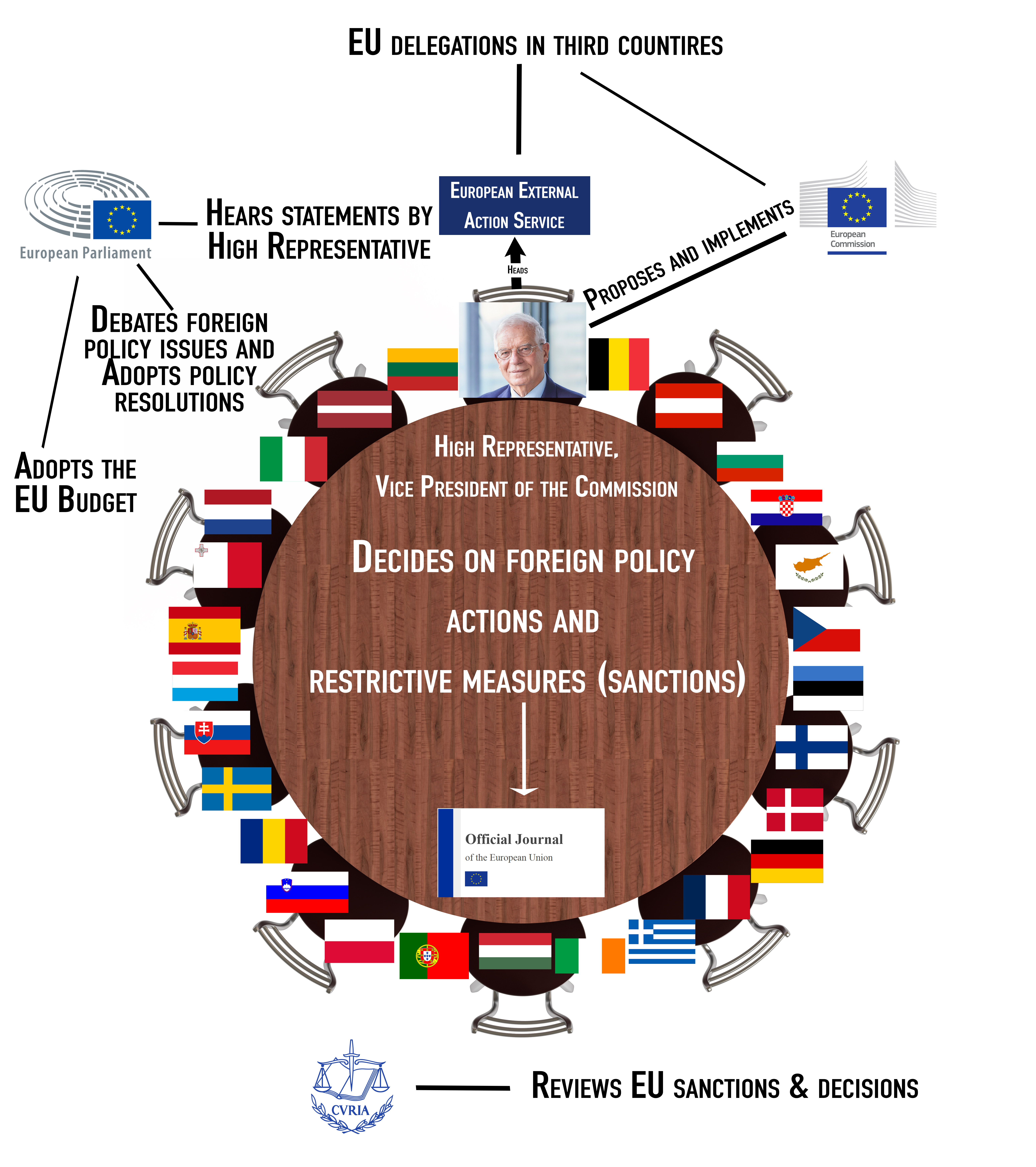
European Commission
European Parliament
Court of the European Union
Why it is important for the foreign policy?
- proposes new laws adjusted to the EU's foreign policy strategy
- represents the Union in international relations
- designs the EU development policy and delivers aid throughout the world
- negotiates international agreements with other actors
- approves new EU laws together with the Council based on Commission's proposal
- more than 40 delegations dedicated to specific countries or organizations
- raises the voice on important foreign policy issues during plenary debates
- the High Representative for Foreign Affairs consults with the Parliament regularly
- interprets EU law and ensures uniformity in all member states
- nullifies EU legal acts if they violate the treaties
- ensures that EU institutions act when they should
- reviews legality of all actions taken by other EU institutions
What it does in the foreign policy domain?
- proposes new laws
- allocates funding to member states
- enforces EU law together with the Court of Justice (CJEU)
- negotiates and adopts laws with the Parliament
- coordinates member states' policies, concludes international agreements
- develops the EU's common foreign and security policy
- adopts and amends laws with the Council
- has the final say on the EU budget
- supervises other EU institution, provides democratic scrutiny
Decision-making on foreign policy is slightly different than in other policy areas. According to Article 27 of the Treaty (the EU constitution), the “Council shall act on a proposal from the High Representative [of the Union for Foreign Affairs and Security Policy], after consulting the European Parliament and after obtaining the consent of the Commission.”
This means that the Parliament cannot veto any decisions on foreign policy, it is merely consulted and can adopt non-binding resolutions.

Moreover, the Council normally takes its decisions by unanimity in most cases. There have been proposals recently to abandon the unanimity principle and to switch to so-called qualified majority-voting (QMV) on foreign policy decisions, too. However, such a move would need the approval of all 27 EU member states. Smaller countries in particular are opposed to giving up their veto power.
The Council has certain instruments at its disposal. One of the so-called restrictive measures against individuals or entities. Commonly, they are referred to as “sanctions”. In practice, being added to the EU sanctions list means that individuals cannot travel to the EU any longer and that the assets they hold in any EU country are being frozen as long as they are under sanctions.
Sanctions need to be confirmed by the Council every six months. Recently, the EU approved restrictive measures against well over a thousand Russian nationals, following the war against Ukraine.
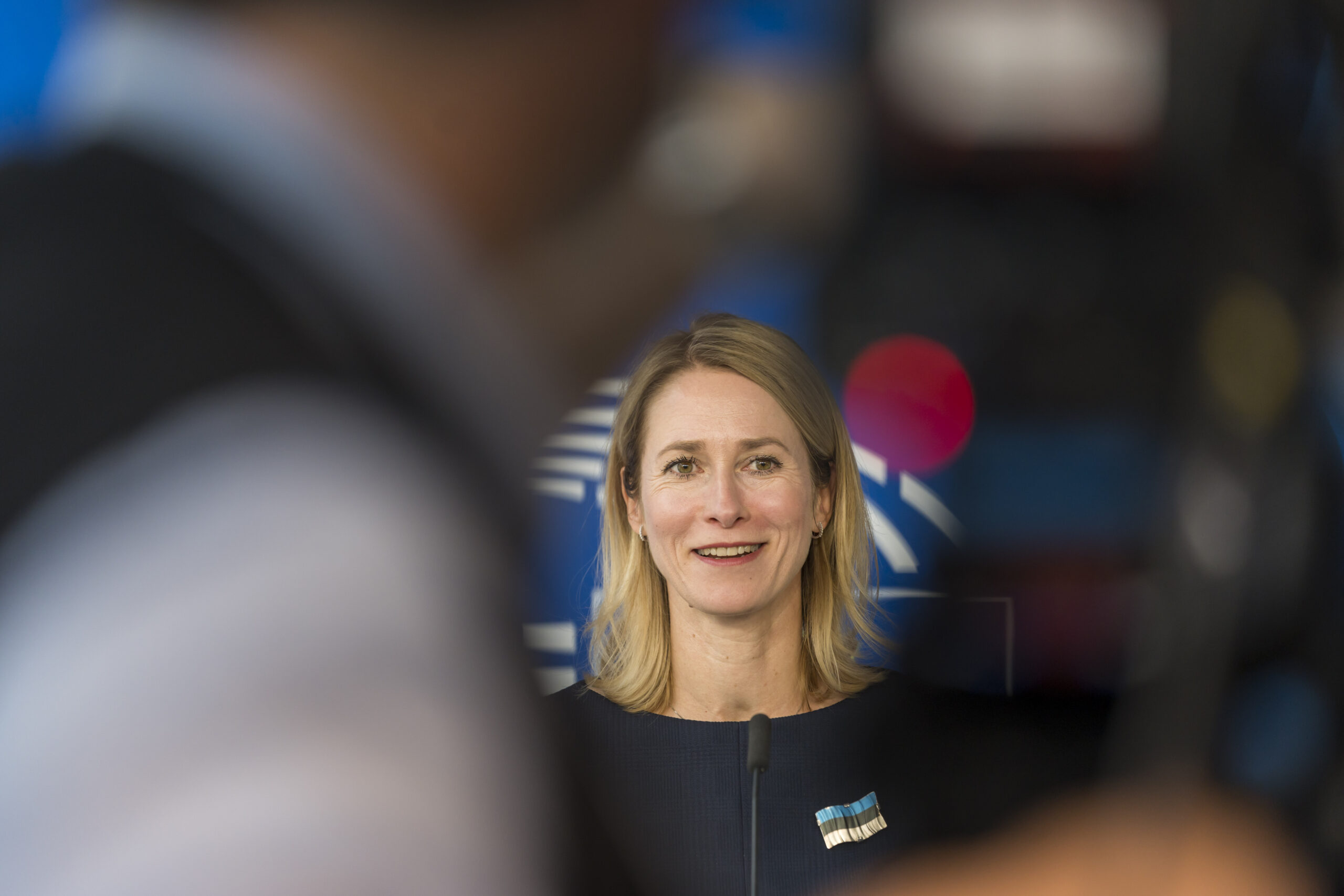
EU Watch interviewed Austrian politician Helmut Brandstätter, who serves for the first time as a Member of the European Parliament. We discussed the issues of Ukraine’s support, EU enlargement, migration and media freedom.
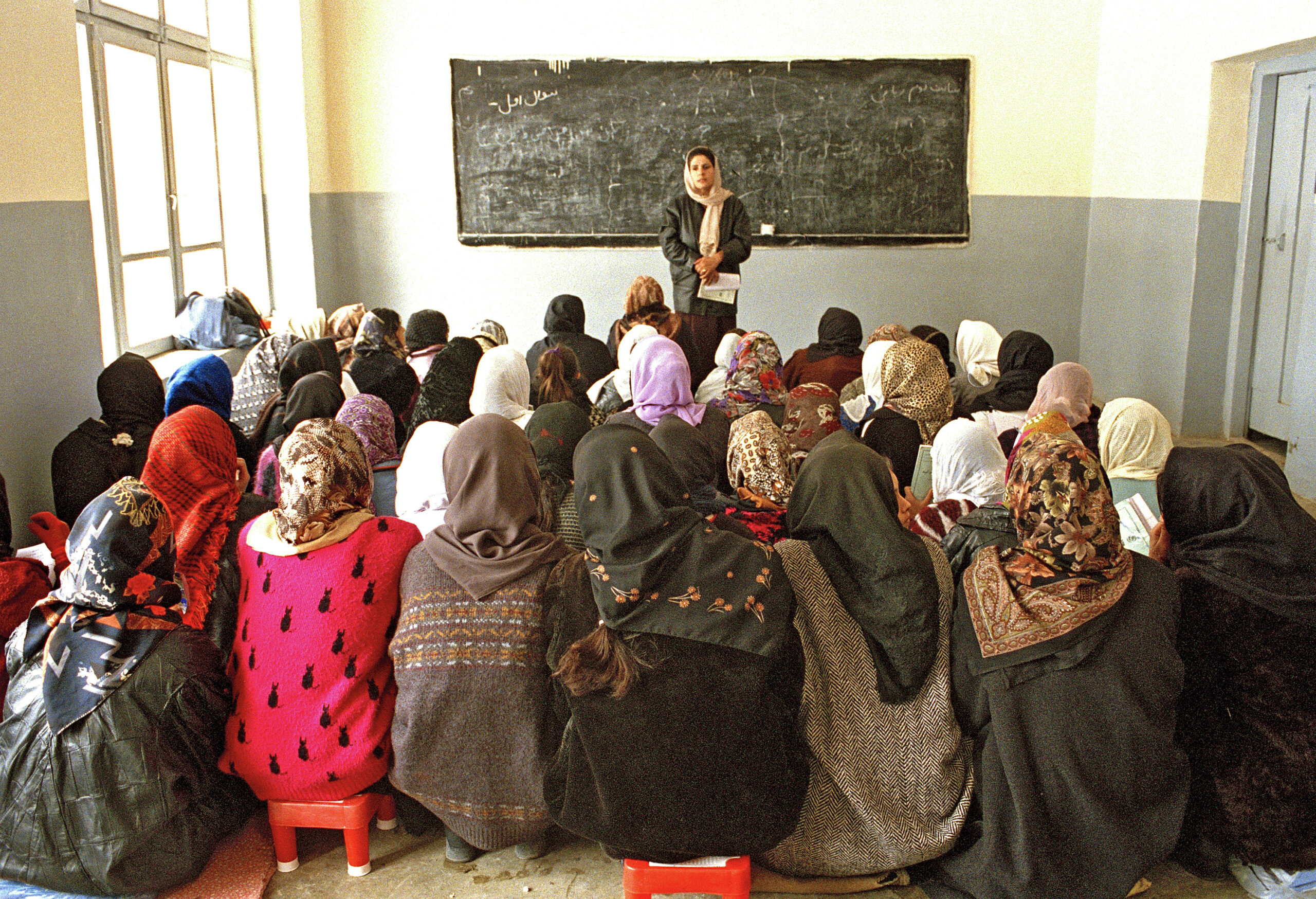
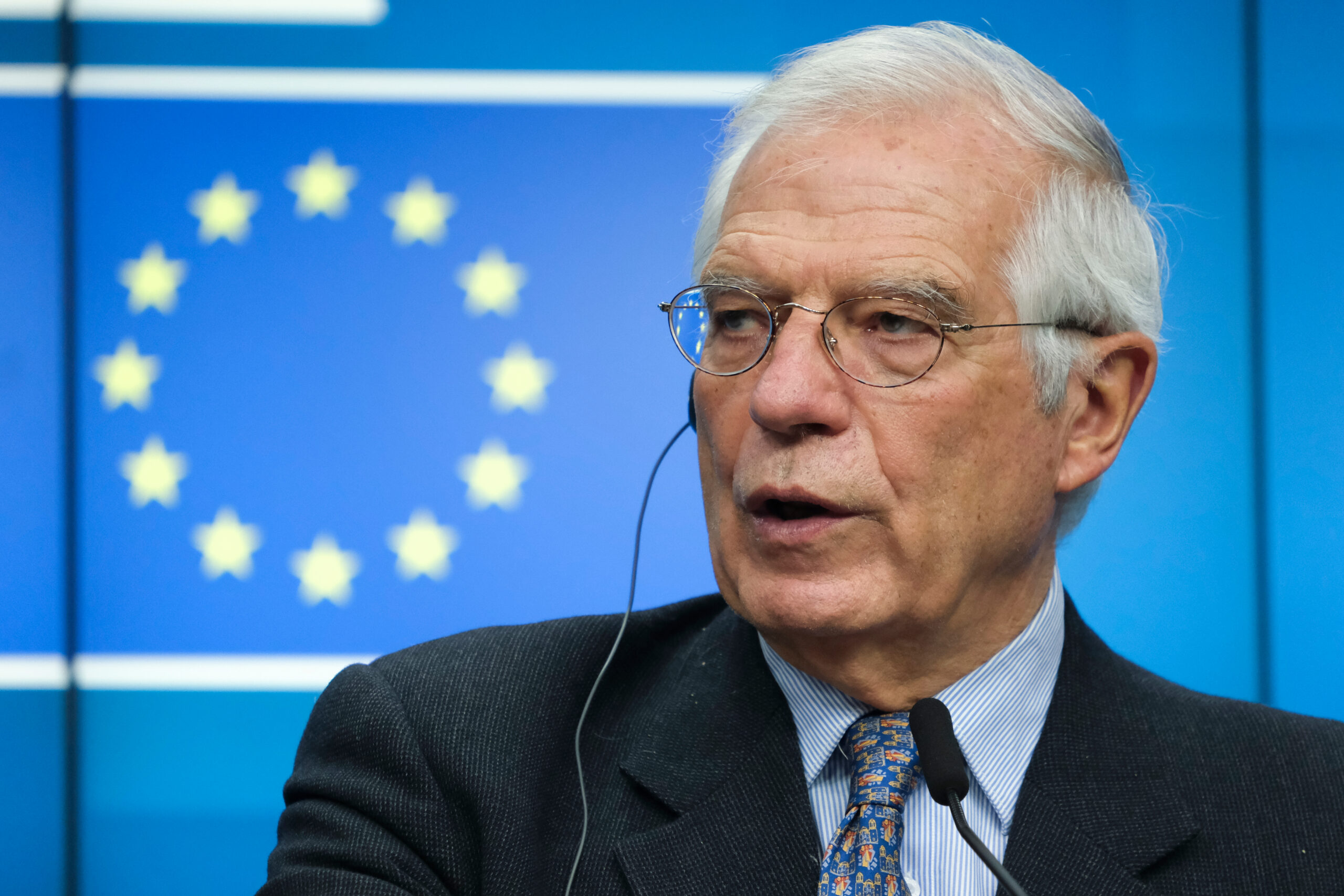
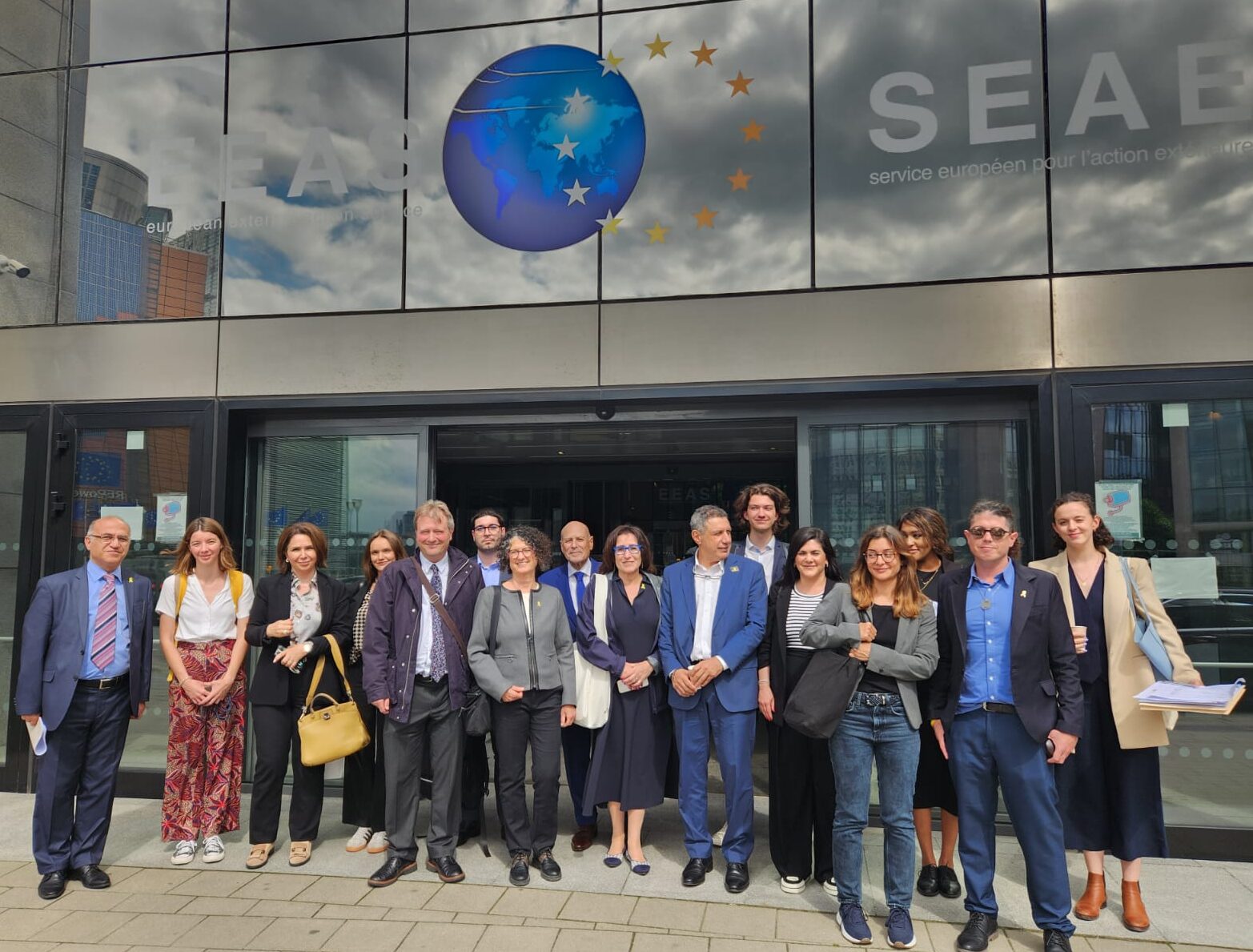
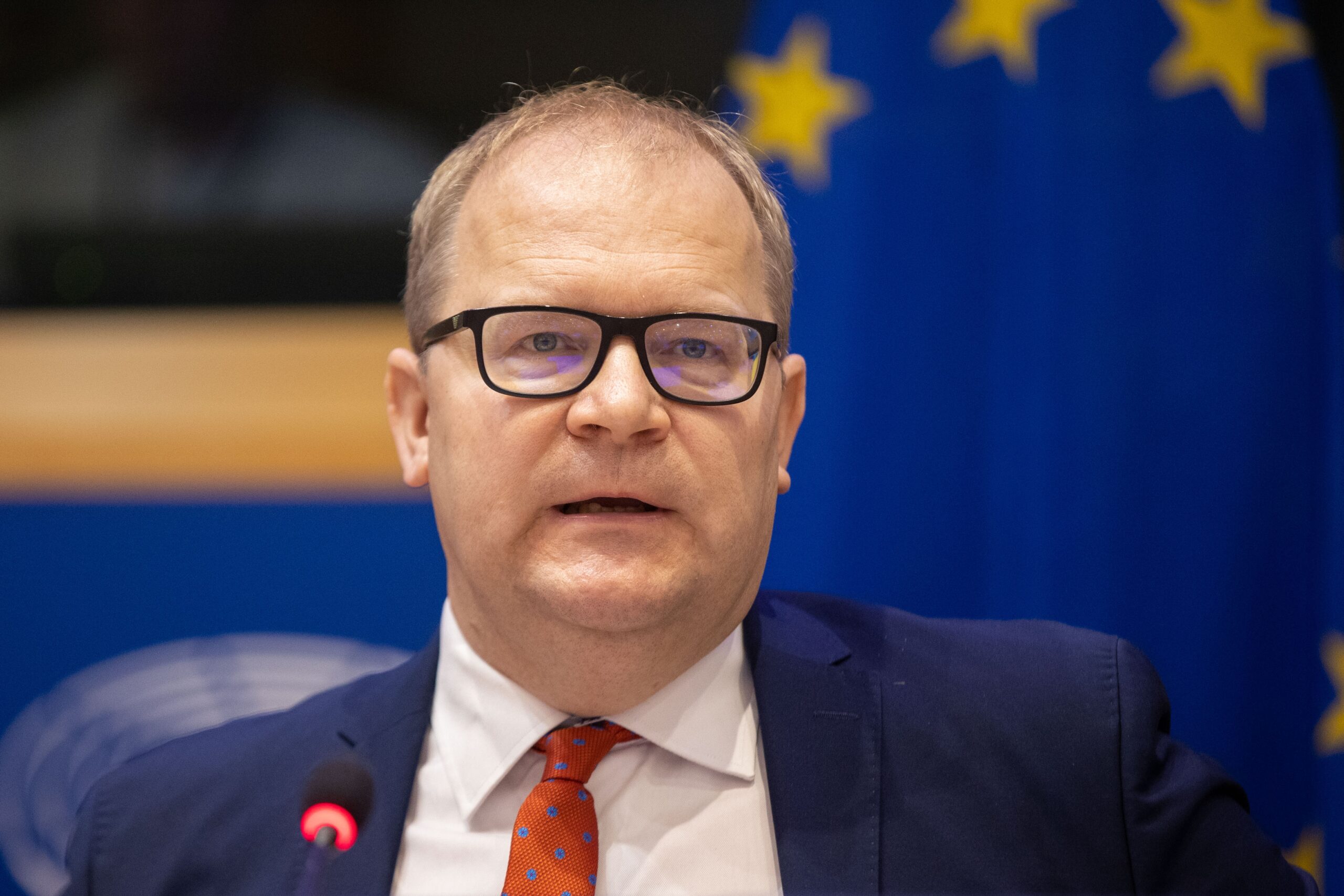
In our most recent podcast edition of “EU Matters”, the Vice-Chair of the Foreign Affairs Committee of the European Parliament and former Estonian foreign minister, Urmas Paet, talks about the threat of Russia to Europe and the West’s support for Ukraine, as well as the recent developments in the Middle East between Israel and Iran.
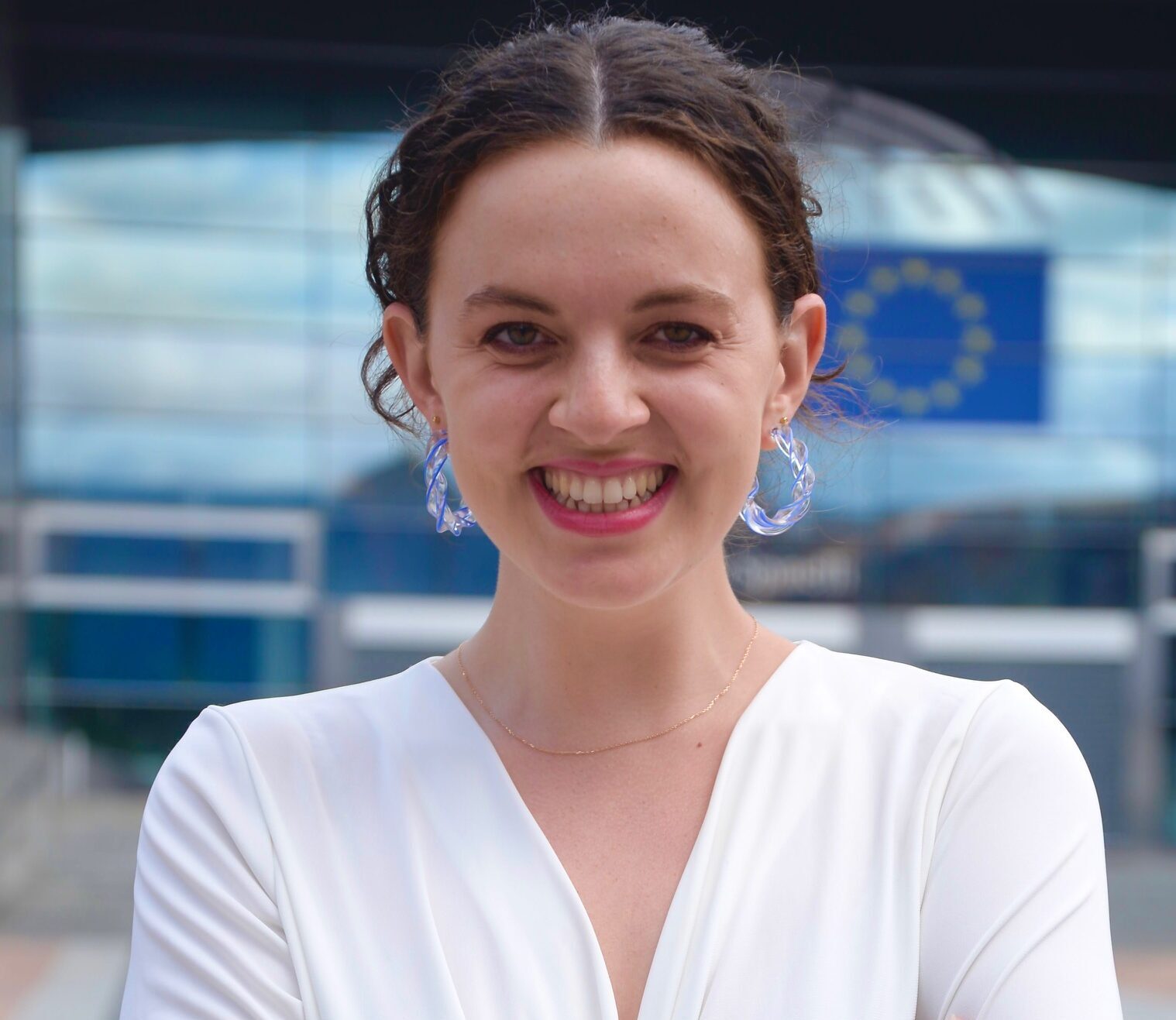
BRUSSELS – EU Watch announces the decision to appoint Avital Grinberg as the new General Manager, succeeding Michael Thaidigsmann at the helm of the organisation.
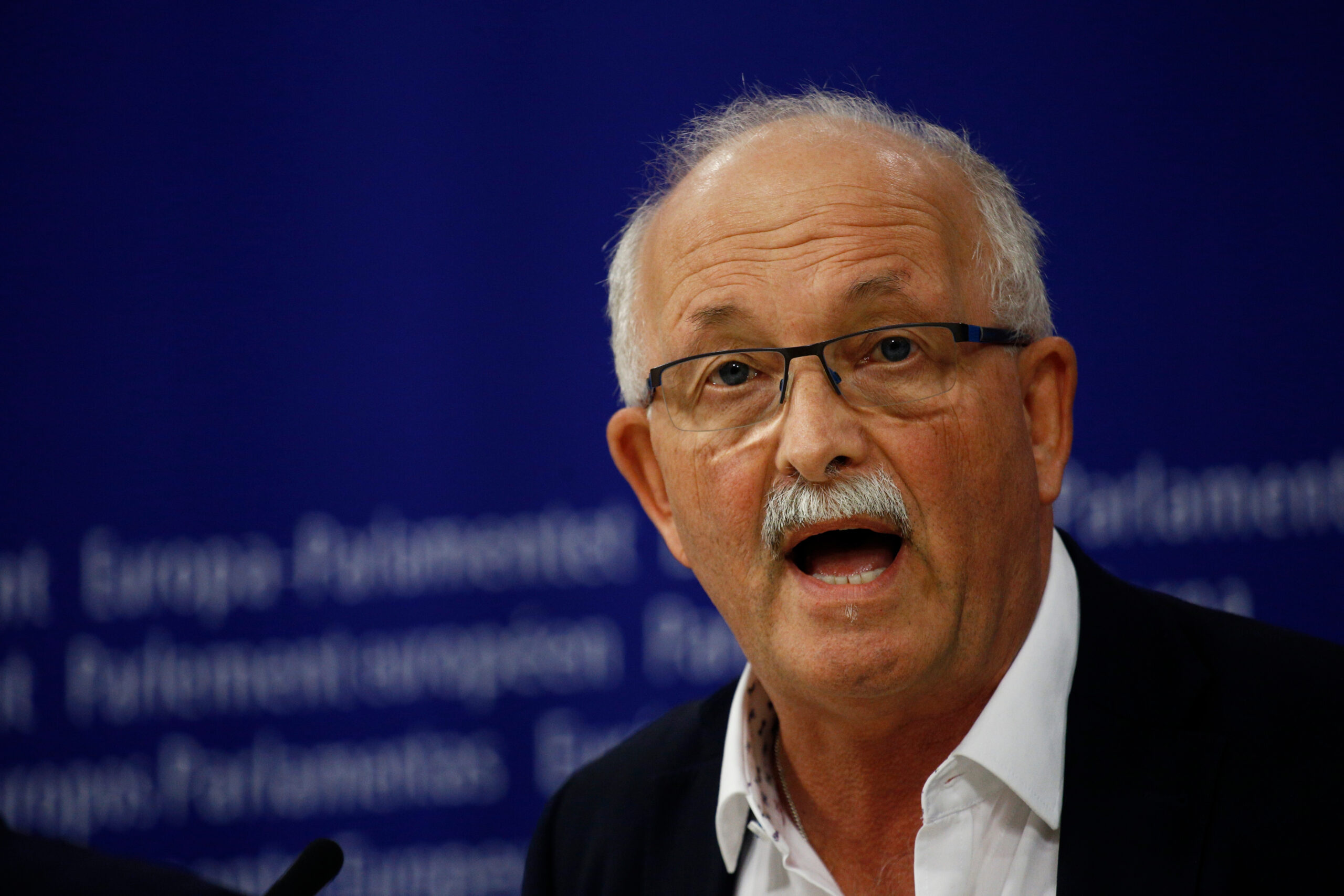
German MEP Udo Bullmann talks about the importance of human rights in EU’s foreign policy, the EU as a player on the world stage and foreign interference in EU politics.
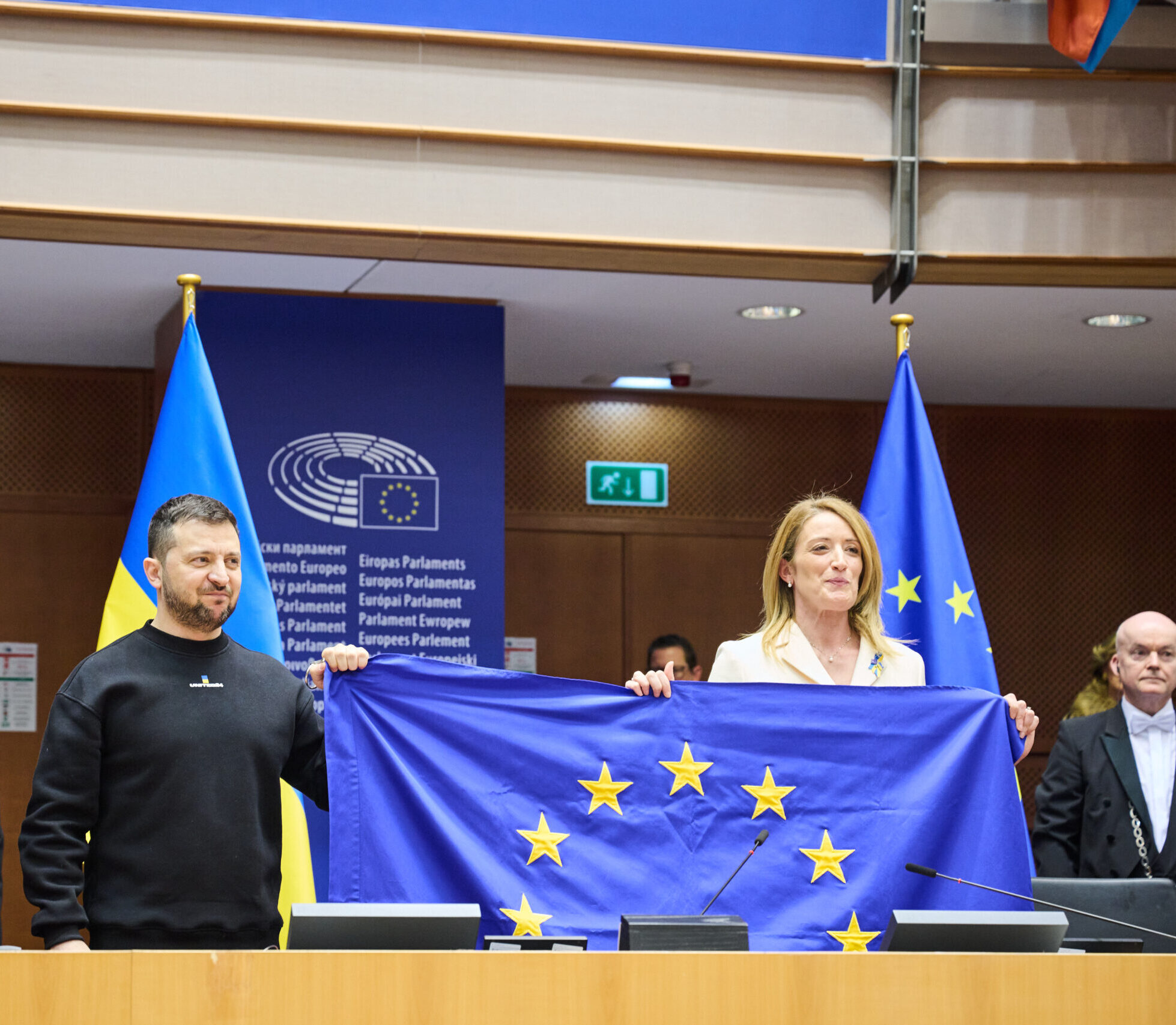
Professor Cristina Vanberghen delivers her opinion on the European Council’s decision to green-light negotiation talks with Ukraine and Moldova.
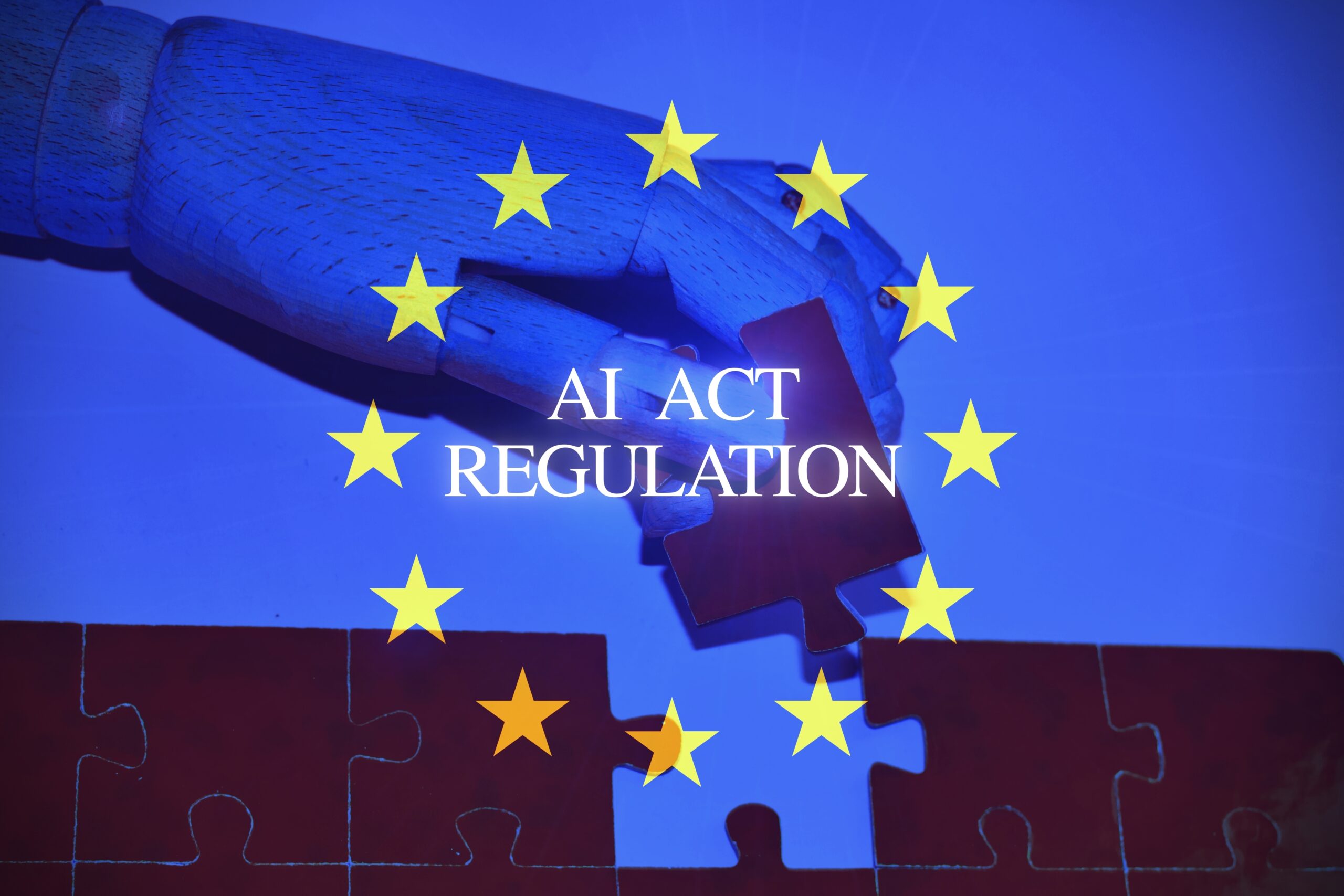
Professor Cristina Vanberghen delivers her analysis of the EU AI Act, which regulates the use of Artificial Intelligence in the Union.

Professor Cristina Vanberghen delivers her analysis on the EU’s role in mediating Middle East conflicts.
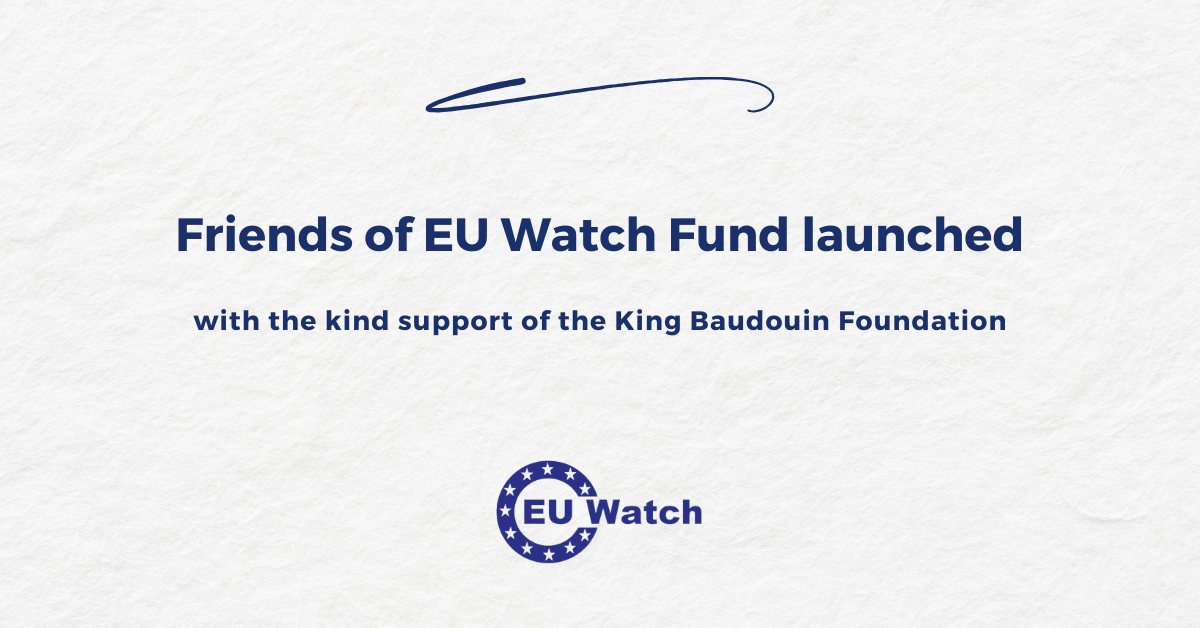
A new fundraising platform to support the mission and projects of EU Watch has been established under the auspices of the renowned King Baudouin Foundation in Belgium.
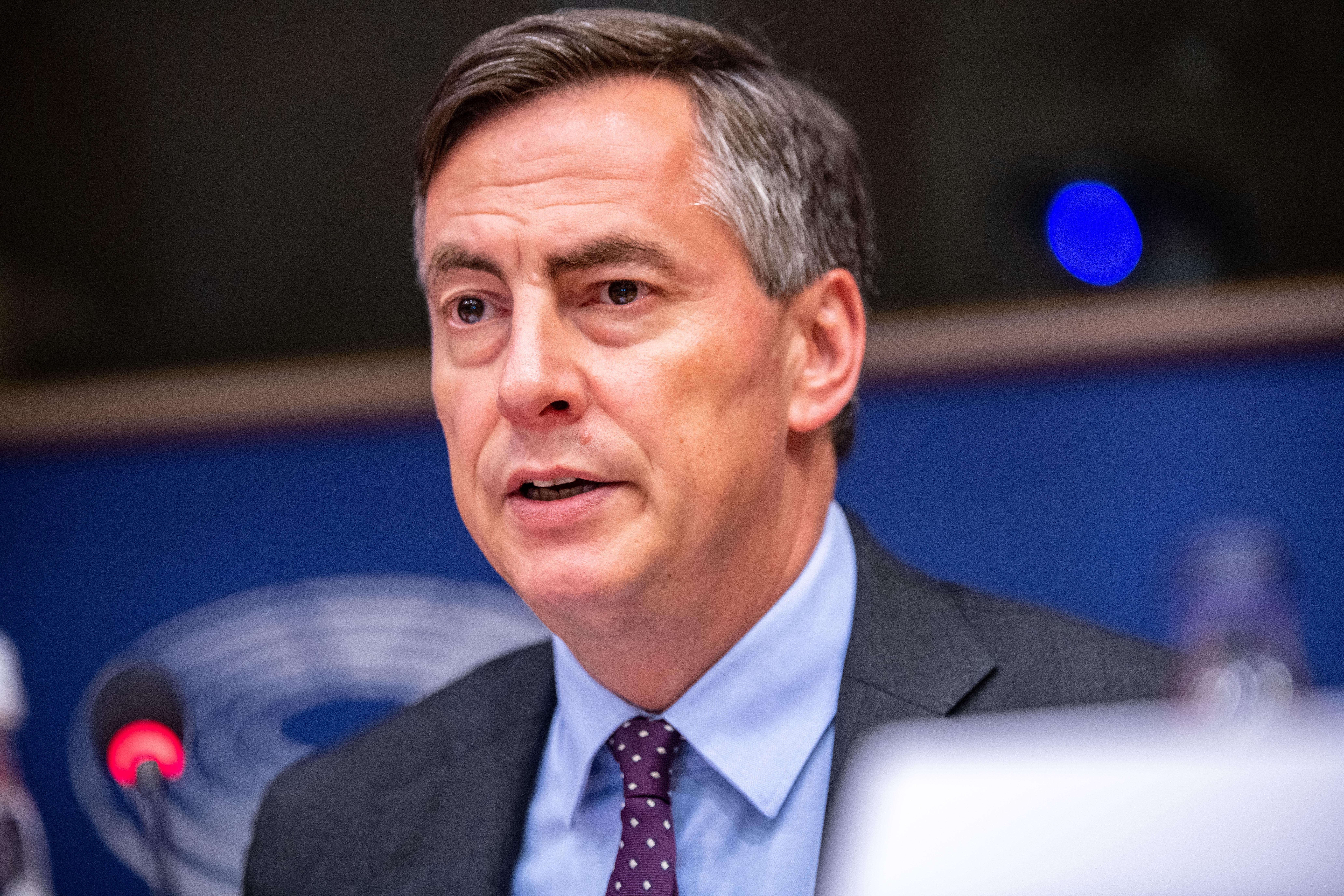
The chairman of the European Parliament’s Committee on Foreign Affairs on the role of the European Parliament and the European Union in world politics.
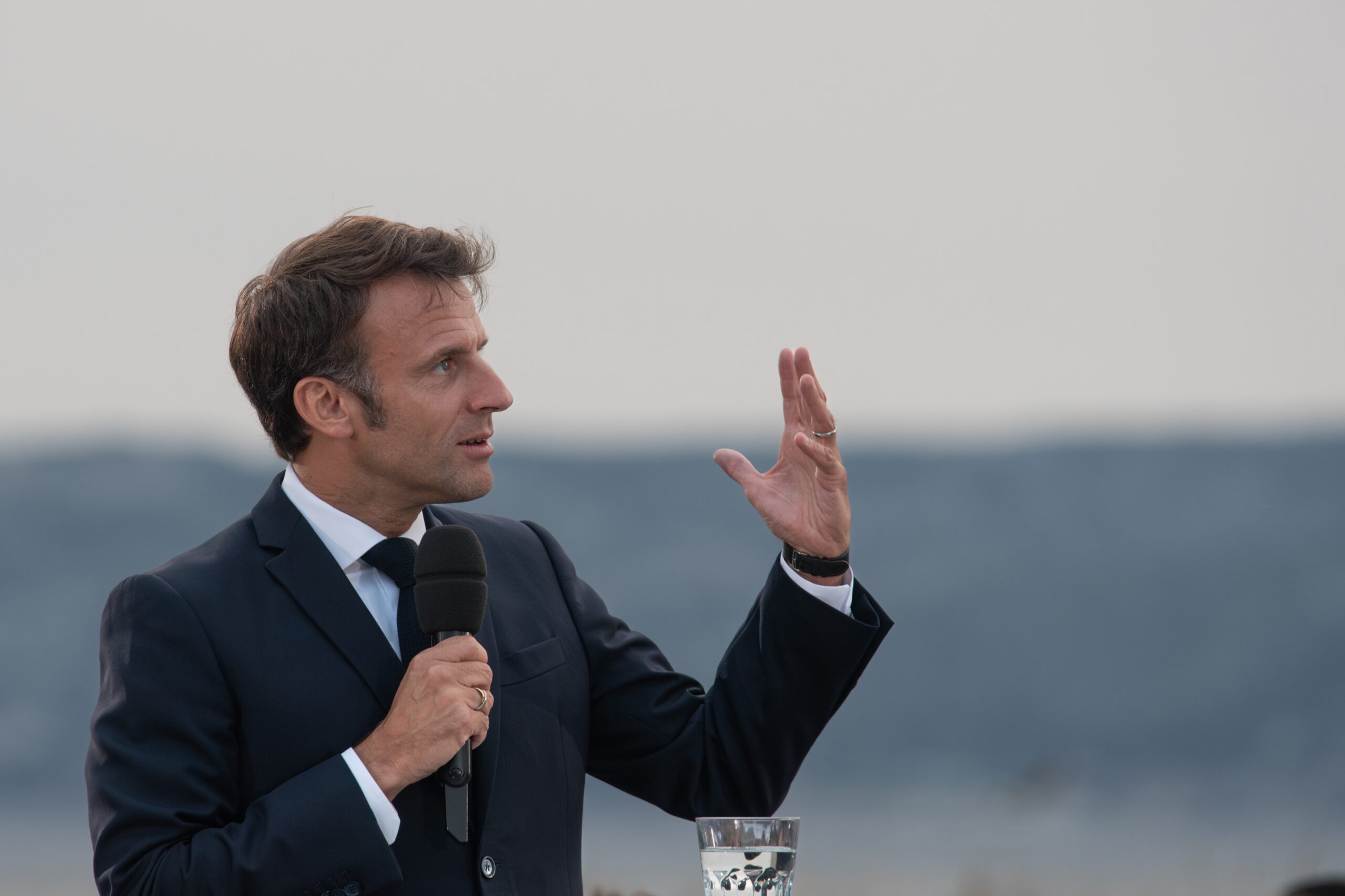
Cristina Vanberghen delivers her thoughts on the Franco-German proposal for EU reform
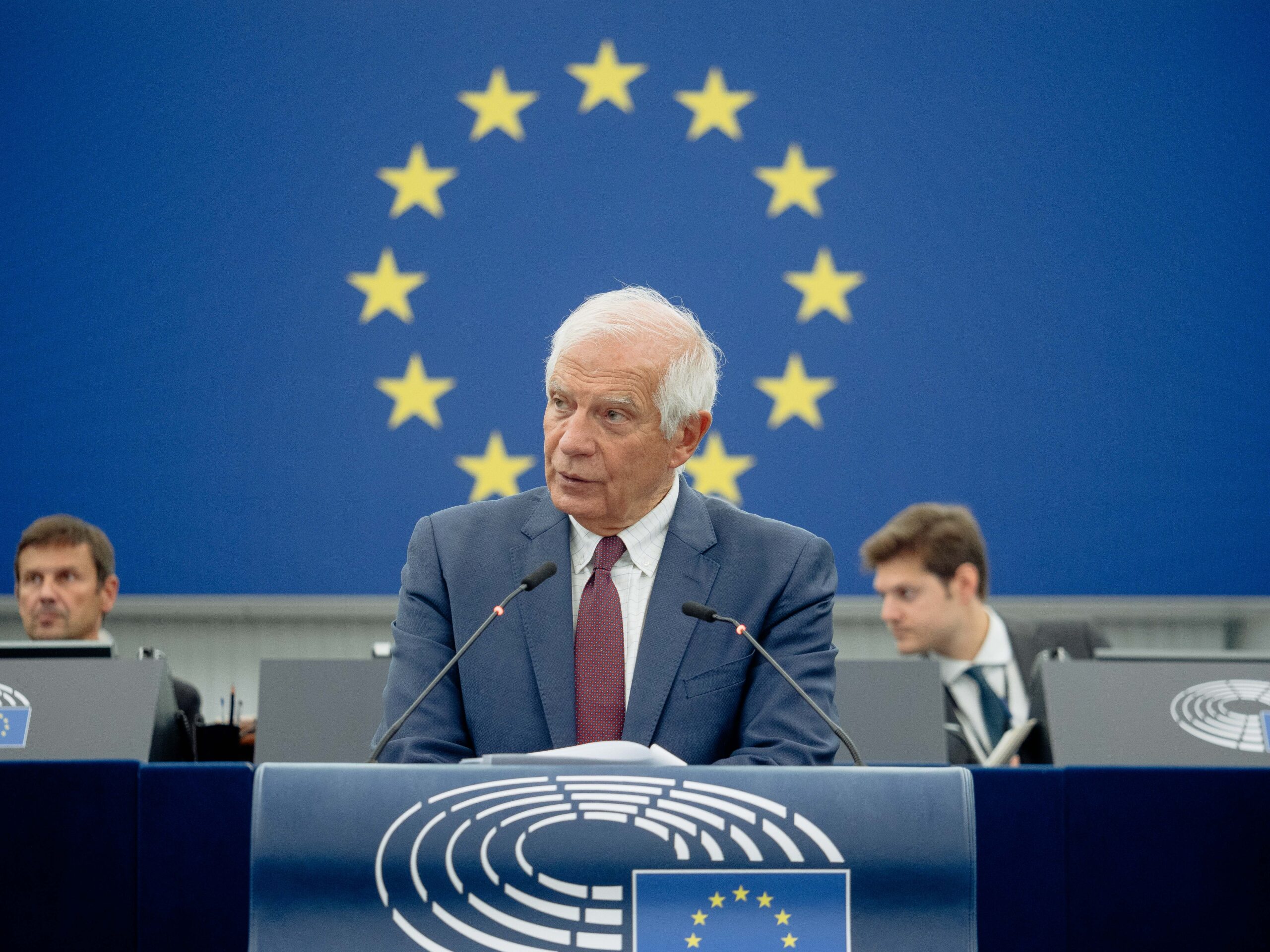
EU foreign policy chief Josep Borrell responds to questions from EU Watch and Hostage Aid Worldwide on European hostages jailed in Iran.
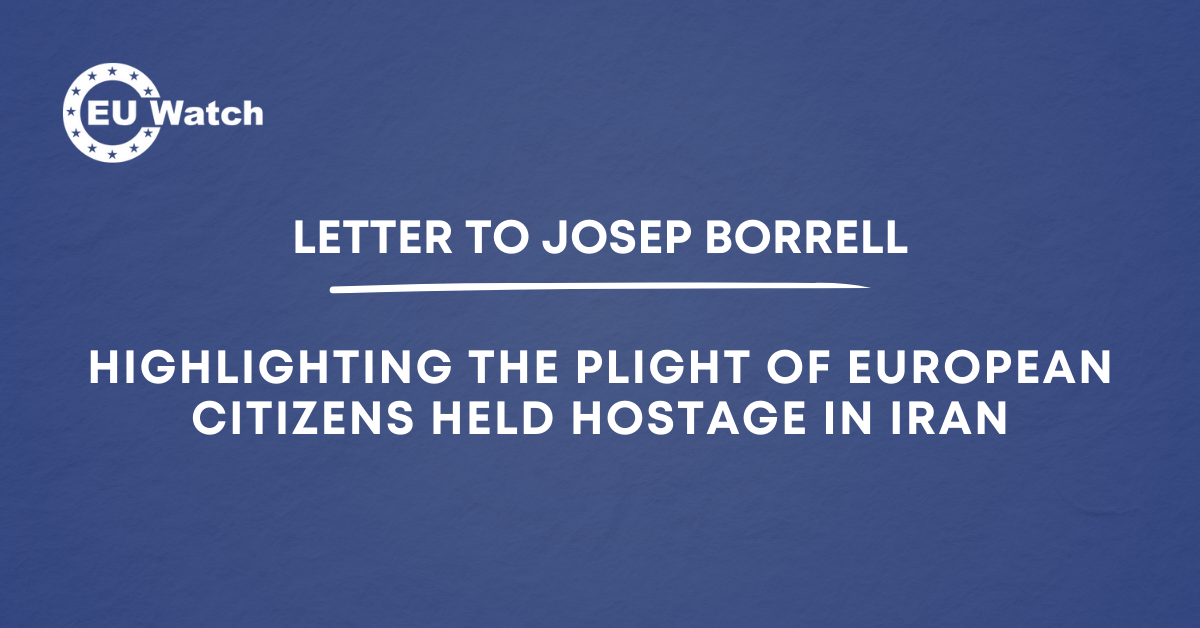
EU Watch and Hostage Aid Worldwide have asked EU foreign policy chief Josep Borrell what he and the EU diplomatic service have done to secure the release of his staff member Johan Floderus and other EU citizens who have been held hostage in Iran for long time.
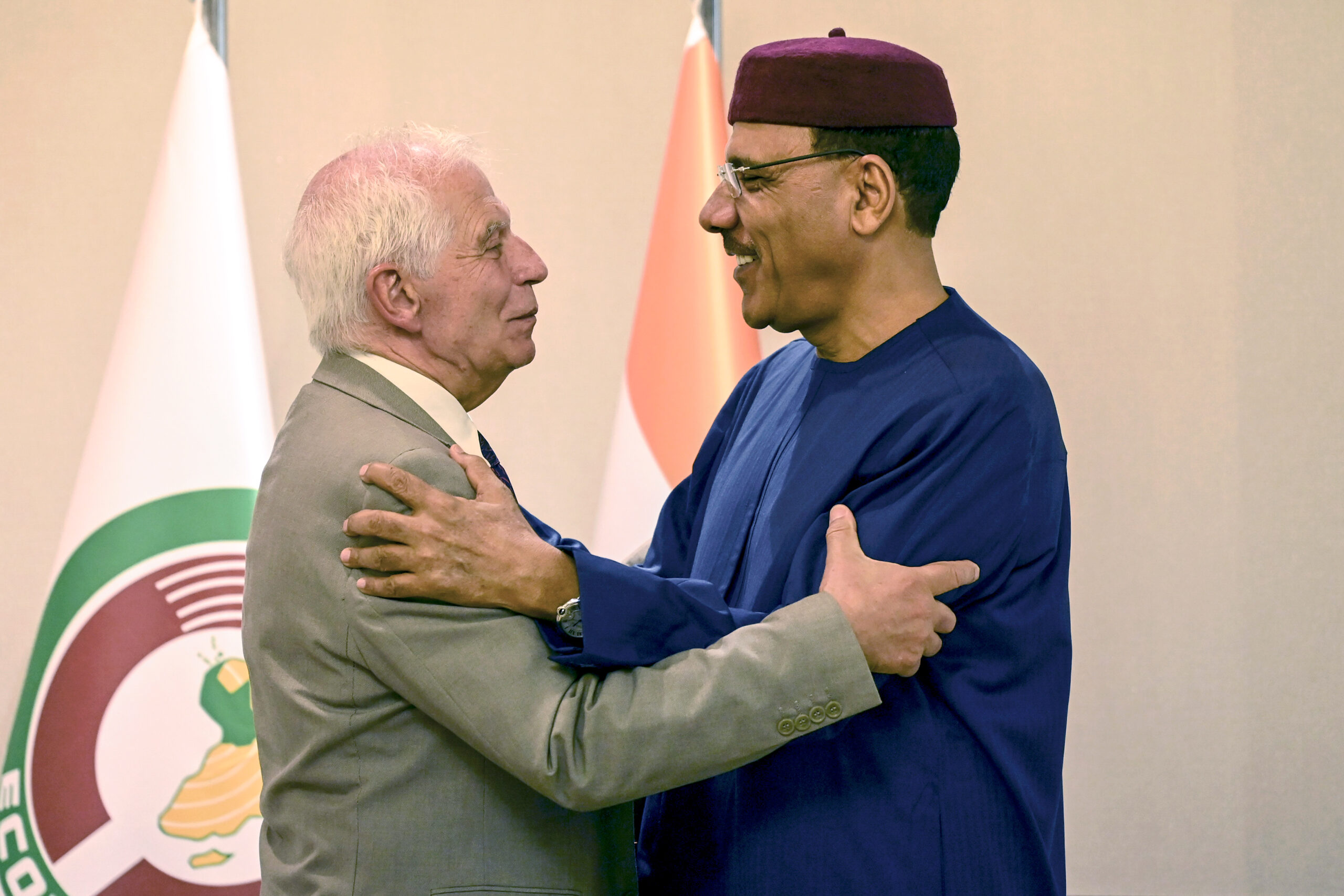
What are the consequences of the military coup in Niger, and is the European Union’s response adequate?

EU Watch joins more than 150 politicians, organizations, and activists in calling for the immediate and unconditional release of Iranian rapper and dissident Toomaj Salehi. Please find below the full letter.

EU Watch interviewed Austrian politician Helmut Brandstätter, who serves for the first time as a Member of the European Parliament. We discussed the issues of Ukraine’s support, EU enlargement, migration and media freedom.

Read More
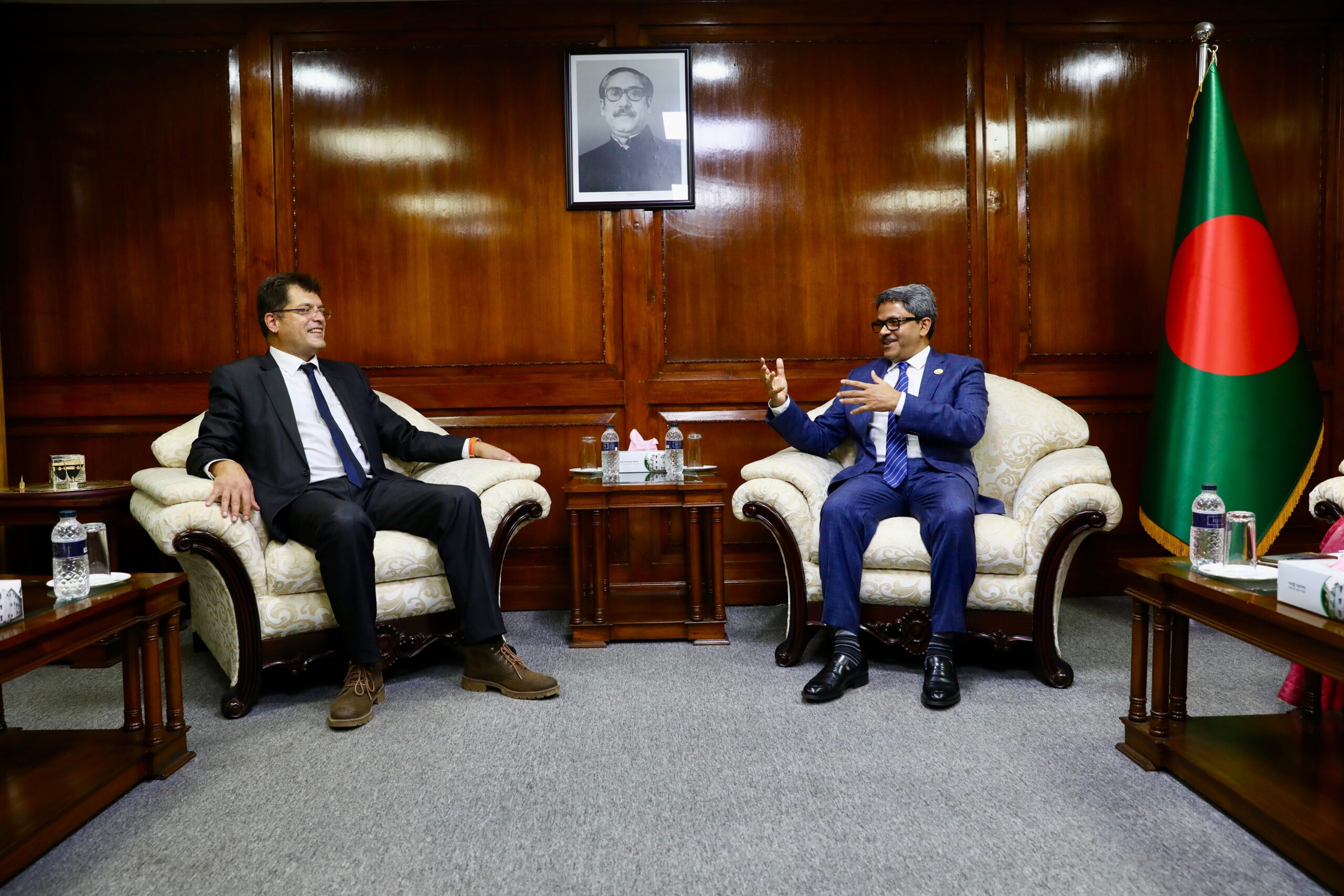


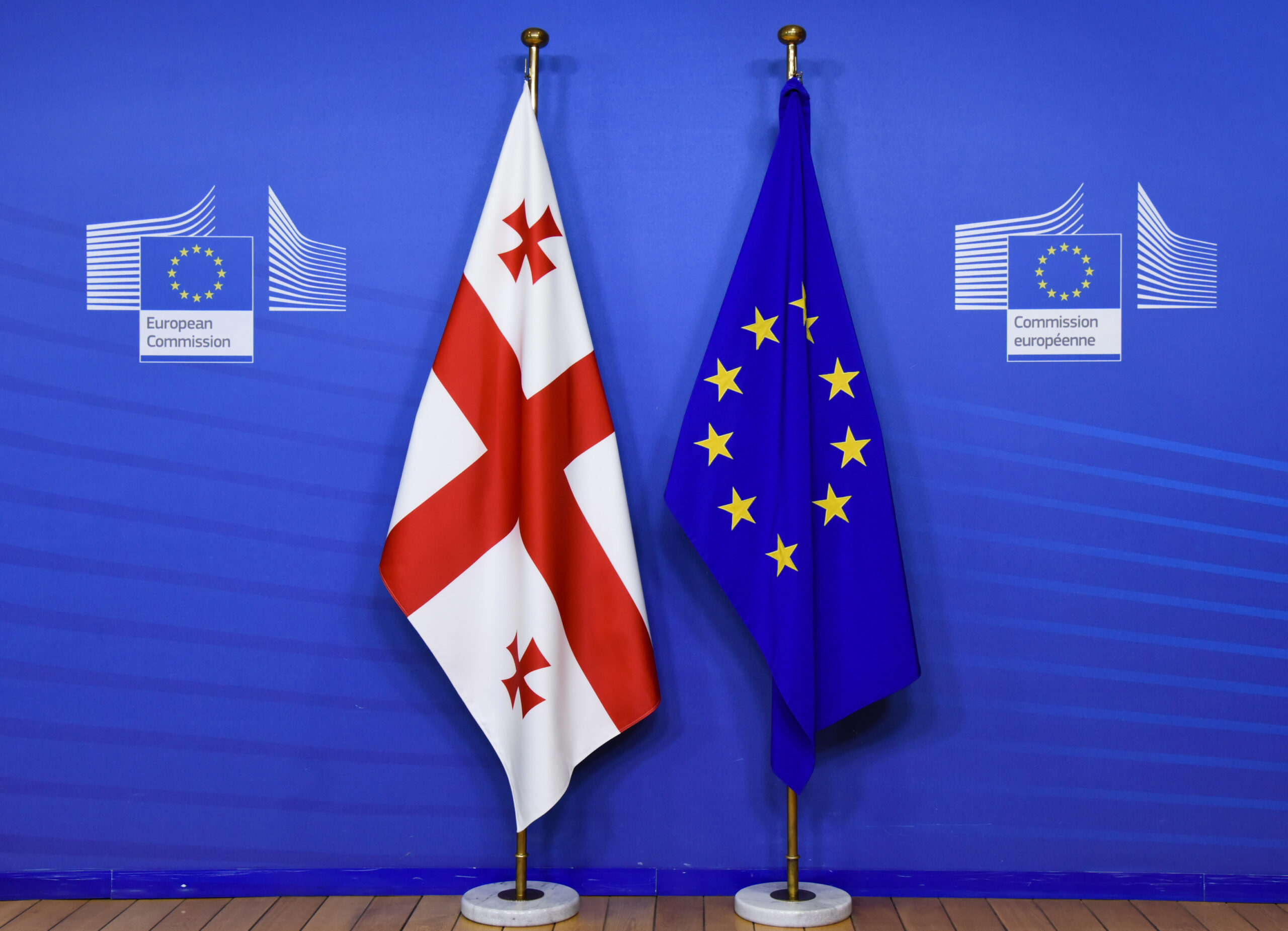
Read More
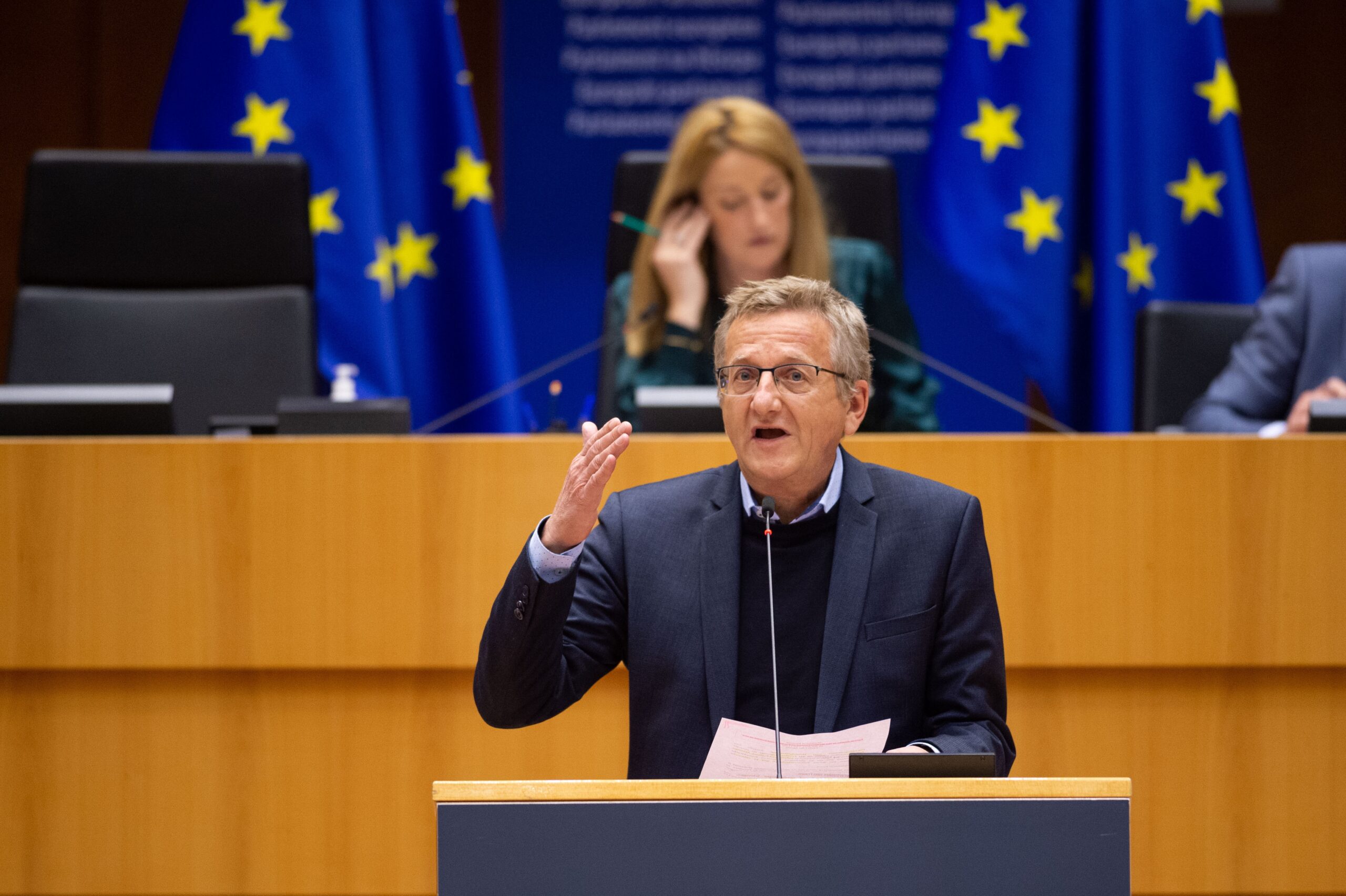
Read More

In our most recent podcast edition of “EU Matters”, the Vice-Chair of the Foreign Affairs Committee of the European Parliament and former Estonian foreign minister, Urmas Paet, talks about the threat of Russia to Europe and the West’s support for Ukraine, as well as the recent developments in the Middle East between Israel and Iran.

BRUSSELS – EU Watch announces the decision to appoint Avital Grinberg as the new General Manager, succeeding Michael Thaidigsmann at the helm of the organisation.

German MEP Udo Bullmann talks about the importance of human rights in EU’s foreign policy, the EU as a player on the world stage and foreign interference in EU politics.

Professor Cristina Vanberghen delivers her opinion on the European Council’s decision to green-light negotiation talks with Ukraine and Moldova.

Professor Cristina Vanberghen delivers her analysis of the EU AI Act, which regulates the use of Artificial Intelligence in the Union.

Professor Cristina Vanberghen delivers her analysis on the EU’s role in mediating Middle East conflicts.

A new fundraising platform to support the mission and projects of EU Watch has been established under the auspices of the renowned King Baudouin Foundation in Belgium.

The chairman of the European Parliament’s Committee on Foreign Affairs on the role of the European Parliament and the European Union in world politics.
















